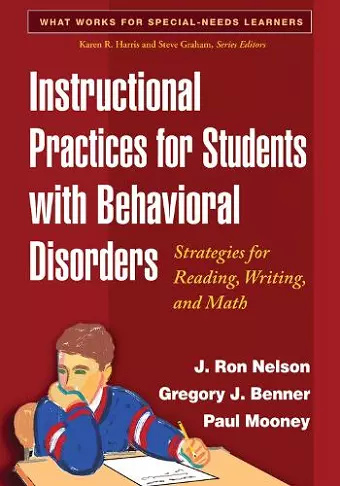Instructional Practices for Students with Behavioral Disorders
Strategies for Reading, Writing, and Math
Robert H Horner author Paul Mooney author J Ron Nelson author Gregory J Benner author Jessica Swaye author
Format:Paperback
Publisher:Guilford Publications
Published:15th May '08
Currently unavailable, our supplier has not provided us a restock date

Presenting a broad range of instructional programs and practices that are proven effective for students with behavioral disorders, this is the first resource of its kind for K–3 teachers and special educators. Described are clear-cut strategies for promoting mastery and fluency in early reading, writing, and math, while tailoring instruction to each student's needs. Grounded in a three-tiered response-to-intervention framework that facilitates data-based assessment, decision making, and progress monitoring, the book includes helpful examples and reproducibles. A special chapter outlines instructional management procedures for enhancing student engagement and promoting positive behavior.
"Nelson et al. provide a practical, concise summary of research-validated practices that teachers can use to select curriculum materials and deliver instruction. The authors focus on the needs of students with behavioral disorders, but the principles in this book apply to all students. The major feature that distinguishes this book is the response-to-intervention (RTI) framework; the authors describe how RTI can improve schools and how it can be applied to specific reading, math, writing, and classroom management practices. The main ideas in this text are well defined with clear and descriptive examples, and teachers (or teachers in training) will find suggestions they can implement directly and immediately. This easy-to-read text will help to make schools more effective learning environments. It is an important and useful contribution to the field."--Robert H. Horner, PhD, Special Education Program (Emeritus), University of Oregon
"During my five years of teaching special education, working with children with behavioral disorders has involved tremendous instructional challenges (and a few too many sleepless nights). This volume provides important knowledge about how to meet these students' academic needs, along with some effective techniques to add to my teaching tool kit. I'm confident that this book is helping me build my professional competence, and I would recommend it to practicing and preservice teachers alike."--Jessica Swaye, special education teacher, G. W. Carver Primary School, Ascension Parish school district, Gonzales, Louisiana
"This is an outstanding resource for school practitioners. It is one of the few books available on responding to the academic performance and instructional needs of students with behavior problems that disrupt their learning. Nelson and his colleagues have conducted some of the very best work in our field on this topic, and this research experience certainly informs the content of the book in a most beneficialfashion. I recommend this volume to all school personnel who work with this student population."--Hill M. Walker, PhD, Department of Special Education and Clinical Services (Emeritus), University of Oregon; Senior Scientist, Oregon Research Institute
"As a teacher educator and researcher interested in teaching my students how to put research into practice, I found this book to be extremely well organized and practical. The book helps present and future teachers understand how educational theory relates directly to what we know about teaching students with behavioral disorders. This impressive collection of hands-on teaching techniques will be useful to teachers working in a variety of instructional settings. It is exciting to see a book that truly connects research and practice!"--Jill H. Allor, EdD, Department of Literacy, Language, and Learning, Southern Methodist University
-
ISBN: 9781593856724
Dimensions: unknown
Weight: unknown
189 pages